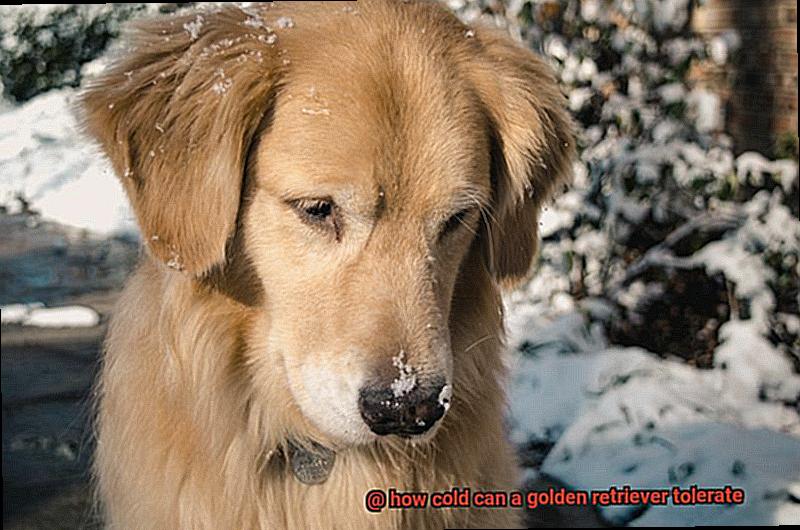Have you ever wondered how your furry best friend would cope in bone-chilling winter weather? As the snowy months approach, it’s crucial to know your dog’s limits when it comes to tolerating the icy cold. So, let’s answer the question that every golden retriever owner asks: How cold can a golden retriever tolerate?
Golden retrievers are famous for their friendly and playful personalities, not forgetting their gorgeous golden coats. But did you know that their thick, fluffy fur also provides insulation and helps them regulate their body temperature? Nevertheless, how well can they handle extreme cold weather?
In this article, we’ll delve into the science behind dogs’ internal temperature regulation and how they adapt to frigid conditions. We’ll also examine the warning signs and symptoms of hypothermia and ways to prevent it in your furry friend. As a pet owner, understanding how your pup reacts to chilly weather is vital so that you can keep them secure and cozy during winter.
Without further ado, let’s discover just how low our furry friends can go.
What Temperature Can Golden Retrievers Withstand?
Contents
Golden Retrievers are a beloved breed known for their friendly nature and stunning coat. But, when it comes to cold weather, owners need to be aware of their furry friend’s limits. As an expert on this topic, I can tell you that Golden Retrievers can typically tolerate temperatures between 32 and 70 degrees Fahrenheit. However, every dog is unique, so factors like age, health, weight, and coat thickness can affect their tolerance level.
It’s essential to keep in mind that extreme weather conditions like wind chill, humidity, rain or snow can also impact a dog’s ability to handle colder temperatures. As a responsible owner, it’s recommended that you don’t leave your furry friend outside in temperatures below 20 degrees Fahrenheit or above 90 degrees Fahrenheit for extended periods of time.
When taking your Golden Retriever out in cold weather, it’s crucial to monitor their behavior and physical condition. Look out for signs of discomfort or distress like shivering, lethargy, reluctance to move, or lifting paws off the ground. If any of these signs are present, bring them inside and warm them up.
To help your Golden Retriever better tolerate colder temperatures, there are a few steps you can take. Providing them with a warm shelter or coat is one option. Using booties to protect their paws from snow and ice is another. And remember, limiting their time outside in extreme weather conditions will help keep them safe and comfortable.
Factors That Affect a Golden Retriever’s Cold Tolerance
They are known for their friendly nature and their knack for outdoor activities. However, it’s important to note that they can be sensitive to cold temperatures. That’s why it’s crucial to understand the various factors that can affect their cold tolerance.
The first and most critical factor that can influence a Golden Retriever’s cold tolerance is their coat. These dogs have a thick double coat that helps insulate them against the cold. But, did you know that the length and thickness of their coat can vary depending on their age, health, and genetics? For example, older dogs or those with certain medical conditions may have a thinner coat, making them more susceptible to the cold. Therefore, it’s essential to keep an eye on your dog’s coat and provide them with extra warmth when needed.
Another factor that can impact a Golden Retriever’s cold tolerance is their weight. Dogs who are underweight or overweight may have a harder time regulating their body temperature in cold weather, putting them at risk of hypothermia. Maintaining your dog’s weight within a healthy range is crucial to ensure they stay warm in cold temperatures.
The amount of exercise and outdoor activity your Golden Retriever gets can also affect their cold tolerance. Dogs who are more physically active and spend more time outdoors may build up a tolerance to colder temperatures over time. However, it’s important to gradually acclimate your dog to colder temperatures and monitor their behavior and body language to ensure they’re not becoming too cold. Remember, don’t push your dog beyond their limits.
Finally, your Golden Retriever’s overall health and age can also impact their cold tolerance. Dogs who are in good health and at a healthy weight are generally better equipped to handle colder temperatures than dogs struggling with underlying health issues. Moreover, older dogs may have difficulty regulating their body temperature in colder weather due to decreased mobility or other age-related conditions. In this case, it’s essential to provide extra warmth and care for your aging furry friend.
Signs of Discomfort in Cold Weather
While they have thick coats that provide insulation against the cold, they can still become uncomfortable and even develop hypothermia in extremely cold temperatures.
One of the most noticeable signs of discomfort is shivering. Although shivering is a natural response to the cold, persistent shivering may indicate that your furry friend needs warming up. Another sign is lethargy or lack of energy. If your Golden Retriever seems to be sleeping more than usual or is unwilling to go outside, it may be because they are feeling too cold.
Furthermore, changes in behavior can also be a sign of discomfort in cold weather. It’s important to pay attention to your dog’s behavior as irritability, and aggression are usually not their usual traits, but they may display these when feeling uncomfortable in the cold. Additionally, excessive whining or barking while outside could indicate that they want to go back inside where it’s warm.
Your dog’s body language can also provide helpful clues. If they are hunched over with their tail tucked between their legs or standing still with their ears back and head down, it may be a sign that they are feeling uncomfortable or afraid in the cold weather. Lastly, if your dog’s paws or ears feel cold to the touch or look red or swollen, it could be a sign of frostbite, and you should take immediate action to warm them up.
Tips for Keeping Your Golden Retriever Safe and Warm in Cold Weather
Golden Retrievers are a breed that loves the great outdoors, no matter the weather. However, during colder months, it is crucial to keep them safe and warm. Here are some tips to ensure your Golden Retriever stays comfortable and healthy in the cold weather.
Provide a Cozy Shelter for Your Furry Friend
A well-insulated doghouse with a raised floor and thick layers of bedding can provide your dog with warmth and comfort on chilly days. Make sure the doghouse is not too big or too small for your dog, as it should retain their body heat.
Keep Your Dog Active During Winter Months
Regular exercise helps increase blood flow and body heat, which is necessary for keeping your dog warm in cold weather. However, be mindful of the duration and intensity of playtime as over-exertion can lead to exhaustion and hypothermia.
Invest in Winter Wear for Your Golden Retriever

Coats, boots, and sweaters specifically designed for dogs can protect them from the cold and keep them comfortable outdoors. Ensure that winter wear fits correctly and does not restrict their movement.
Be Mindful of Your Dog’s Diet During Cold Months
Remember that more calories are required to maintain body heat in low temperatures. Consider adding extra protein and fat to their diet or speak to your veterinarian about recommended dietary adjustments.
Monitor Your Dog’s Behavior and Physical Condition
Always monitor your dog’s behavior and physical condition when they are exposed to cold weather. Signs of discomfort or distress may include shivering, lethargy, and decreased mobility. If you notice any of these symptoms, bring your dog indoors or provide them with additional warmth like a heated blanket or coat.
Benefits of Taking Your Golden Retriever Out in Cold Weather
Even when the temperatures drop in the winter, it’s important to keep your furry friend active and engaged. As it turns out, there are several benefits to taking your golden retriever out in cold weather.
One of the top benefits is providing your dog with a change of scenery and mental stimulation. Just like humans, dogs crave new experiences and smells. A walk in the winter can provide just that – with snow and ice providing an additional sensory experience for your dog. This can help keep them mentally stimulated and happy during the colder months.
In addition to mental stimulation, taking your golden retriever out in the cold weather can help them maintain a healthy weight and exercise routine. Many dogs tend to become less active during winter months, leading to weight gain and potential health problems. By taking your dog out for regular walks or playtime in the snow, you can help them stay active and burn off excess energy.
Lastly, regular exposure to colder temperatures can actually strengthen your golden retriever’s immune system. Studies have shown that exposure to cold temperatures can increase white blood cell activity, which helps fight off infections and diseases. While it’s important to dress your dog appropriately and monitor their time outside in extreme cold, regular exposure to colder temperatures can keep their immune system strong.
Conclusion
To sum up, it’s essential to know your Golden Retriever’s cold tolerance level as a pet parent. While these furry buddies are known for their playful and amiable nature, they can still be sensitive to chilly weather. As an expert in this field, I can confirm that Golden Retrievers can tolerate temperatures ranging from 32 to 70 degrees Fahrenheit. However, factors such as age, health status, weight, and coat thickness may influence their ability to withstand the cold.
It is imperative to keep a close eye on your dog’s behavior and physical condition when taking them out in frigid weather. Signs of discomfort or distress include shivering, lethargy, reluctance to move or lifting paws off the ground. To help your Golden Retriever cope better with colder temperatures, you can provide them with a warm shelter or coat and use booties to shield their paws from snow and ice.
Moreover, regular exercise is crucial for increasing blood flow and body heat necessary for keeping your dog warm during winter. Always monitor your pup’s behavior and physical condition when exposed to cold weather. Finally, there are numerous benefits of taking your golden retriever out in the cold weather such as providing mental stimulation and maintaining a healthy weight.
As a responsible pet owner, understanding how your furry friend reacts to chilly weather is vital so that you can ensure their safety and comfort during winter.









